Parents of kindergarten students in Wenzhou City, China, have been forced to sign a pledge of atheism as a condition for their children staying in school, Bitter Winter reported Friday.
The pledge, which was issued earlier this month, is called a “Kindergarten Family Commitment Not to Believe in Religion” and must be signed by the parents, who must in turn indicate the names of their children.
#Wenzhou, Parents Asked to Sign a “Kindergarten Family Commitment Not to Believe in Religion” https://t.co/ecGqtFEPZs In the mandator statement, they promise to educate their children to #socialism and #atheism. #ReligiousFreedom #China
— BitterWinterMagazine (@BitterWinterMag) March 24, 2023
The text of the document declares that parents “do not hold a religious belief, do not participate in any religious activities, and do not propagate and disseminate religion in any locations,” ChinaAid reported.
The parents also promise to raise “civilized families” who “do not believe in religion, do not participate in any religious activities, do not teach religion to children.” Parents promise to avoid “feudal superstition” and to teach kindergarten children faith in science, socialism, and the Chinese Communist Party.
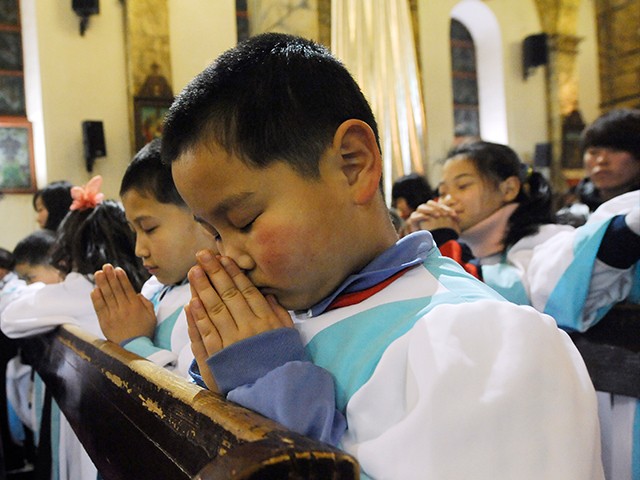
This picture taken on December 24, 2012, shows young Chinese congregation members praying during the Christmas Eve mass at a Catholic church in Beijing. (WANG ZHAO/AFP/Getty Images)
“In the past, the higher-level education department made it compulsory for kindergartens not to be superstitious and not to participate in cult organizations,” an unnamed kindergarten teacher in Wenzhou told ChinaAid, “but did not mandate kindergarten children’s families not to believe in religion or participate in any religious activities.”
In 2019, the Chinese district of Lishan launched a campaign to eradicate religious belief in kindergartens, forcing kindergarten students to sign an atheist manifesto promising to avoid religious activities.
Both pupils and teachers were required to sign a statement pledging not to browse religious websites or participate in religious forums, and including the declaration, “I will adhere to the correct political direction, advocate science, promote atheism, and oppose theism.”
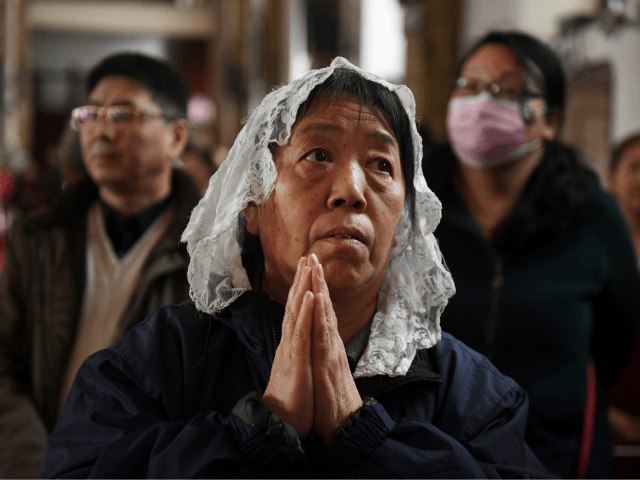
Catholic worshippers attend a mass on Holy Thursday, ahead of Easter celebrations, at Beijing’s government-sanctioned South Cathedral in Beijing on March 29, 2018. (GREG BAKER/AFP/Getty Images)
The campaign forbade schools from hiring new teachers who hold religious beliefs, and called for increased supervision of teaching staff, including “comprehensive inspections of teachers’ preparation for lessons in order to root out any and all religious content.”
Wenzhou, located in the Zhejiang Province, is one of the most vibrant Christian regions in China and has also suffered some of the most severe anti-Christian repression. It was the scene of China’s notorious cross-demolition campaign, which resulted in the destruction or removal of hundreds of crosses and the bulldozing of some 50 Christian churches.

A man peeks through a main entrance gate of the Nantang Catholic Church in Beijing, Wednesday, Dec. 28, 2016. (AP Photo/Andy Wong)
The city of Wenzhou has been called China’s Jerusalem because it contains half of the Zhejiang province’s 4,000 churches. Prior to the crackdown carried out in the last decade under Chinese President Xi Jinping, the city skyline used to be replete with rooftop crosses.
In 2017, China’s communist government began installing surveillance cameras in Christian churches of the Zhejiang province in order to monitor who is attending services as well as the content of what is being preached.
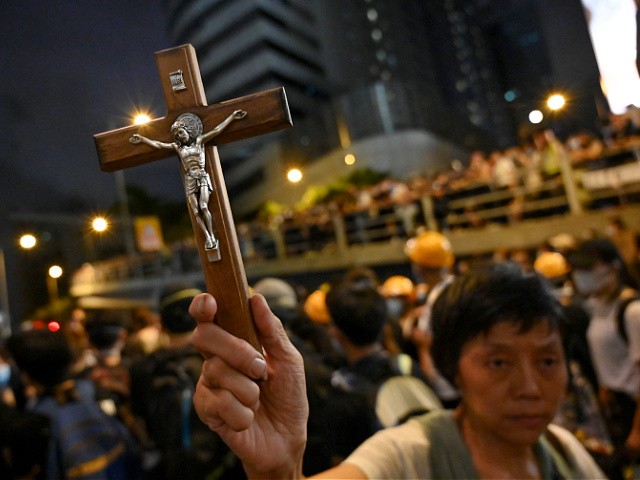
A protester holds a Christian cross as others gather outside the police headquarters in Hong Kong on June 21, 2019. (HECTOR RETAMAL/AFP via Getty Images)
The Zhejiang government issued installed surveillance cameras in the churches in Wenzhou allegedly for “anti-terrorism and security purposes,” an obvious lie since China has not experienced any threat of terrorist activity from its Christian communities.
President Xi has repeatedly insisted that scientific atheism is an essential feature of Marxism and the “total prohibition of any religious education for Chinese children” is part of these campaigns, Bitter Winter noted.
In 2020, Open Doors, a Christian persecution watchdog group, reported that China had begun targeting children to stamp out future generations of Christian believers.
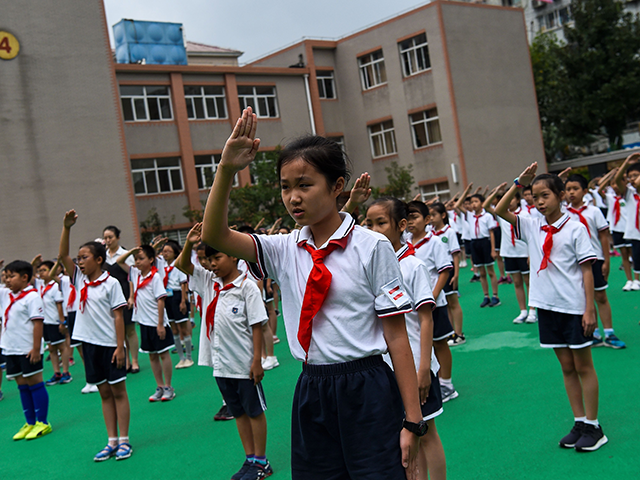
In this photograph taken on September 27, 2017, students sing the national anthem in the playground during the flag-hoisting ceremony at their school in Shanghai. (CHANDAN KHANNA/AFP via Getty Images)
Regulations issued in 2018 specifically banned church youth camps, forbade young Christians from sharing their faith with their friends at school, and prohibited anyone under the age of 18 from entering a church.
According to the 2018 restrictions, Christian students caught attending church or a Christian youth group or sharing their faith, risked being fined or not allowed to graduate.
Maher: It’s Naive to Think ‘a Surveillance State’ Isn’t Taking our Data and Propagandizing with TikTok:
Christian parents began discouraging their children from attending church activities out of fear of government or school reprisals, Open Doors said, meaning they have no exposure to Christian worship, bible study, or the sacraments.
“We know of some school teachers who warn children that if they follow Jesus they may not be allowed to graduate,” said one Chinese church leader on condition of anonymity. “This creates a terrible struggle in young people’s hearts.”
“They are torn between living free in the truth of who they really are, versus possible punishment at the hands of their teachers or parents,” he continued. “If they admit they follow Jesus, they could lose everything they have worked for.”
Thomas D. Williams is Breitbart Rome Bureau Chief and the author of The Coming Christian Persecution.
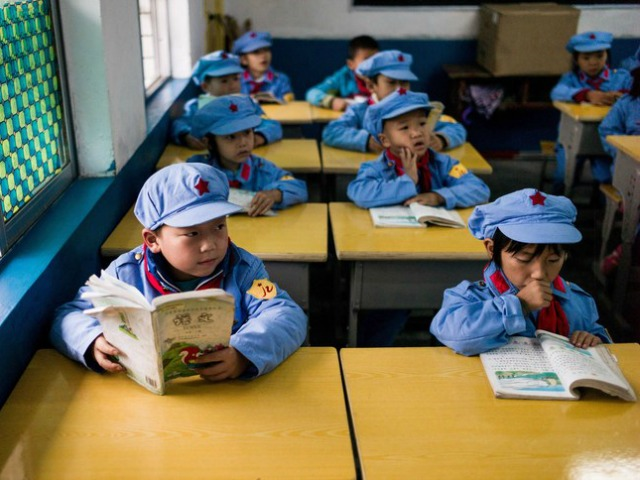
COMMENTS
Please let us know if you're having issues with commenting.